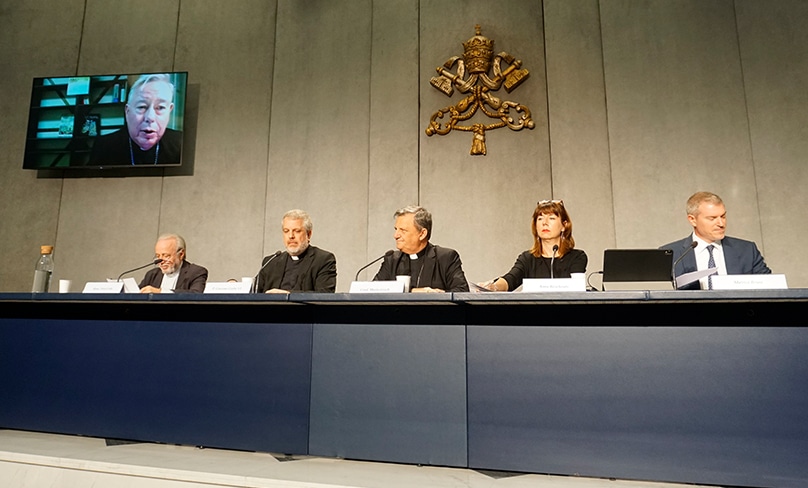
The image used by the latest Synodality document is not obscure: things are set to change
The working document for the continental stage of the Bishops’ Synod on Synodality has been released, giving the Church the strongest sign yet of how its synodal realignment will take place.
Many of its themes will be familiar to Australians who followed the Plenary Council: the document for the continental stage (DCS) identifies structural “obstacles” to synodality including “hierarchical structures that foster autocratic tendencies”, the “institutionalisation” of charisms and ministries, individualism, and sociocultural and economic biases in favour of the wealthy.
The baptismal dignity of all Christians is identified as “the basis for the renewal of life and ministries in the Church”, and special attention is paid to a “rethink” of women’s participation:
“There is almost unanimous affirmation that women love the Church deeply, but many feel sadness because their lives are often not well understood, and their contributions and charisms not always valued,” the DCS reads.
The DCS gives a glowing review of the global synodal process so far, reporting the delight many Catholics had in being listened to for the first time, and praises the method of “spiritual conversations” that has become synodality’s hallmark.
Despite persistent criticisms about low participation rates (in many countries less than one per cent of Catholics) the report says that global participation “exceeded all expectations”.
Certainly at the institutional level, to have received submissions from 112 out of 114 Episcopal Conferences, from all 15 Eastern Catholic Churches, plus dicasteries of the Roman Curia, institutes of consecrated life, lay movements and the like, is an enormous achievement.
“This quite dense piece of jargon seems to suggest that … the Mass could be adjusted to foster more ‘active participation’.”
The DCS identifies several tensions and regrets: that the voices of youth and priests were underrepresented, overlap with the pandemic, a lack of confidence in the process and the suspicion that synodality will result in changes to Church teaching.
It also alludes to the recent controversy over the Latin Mass in the wake of Pope Francis’ Traditionis Custodes, identifying “knots of conflict which need to be addressed in a synodal manner, such as discerning the relationship to preconciliar rites”.
Further on liturgy, the document obscurely points to the “shortcomings of the actual celebratory praxis, which obscure its synodal effectiveness” and the “protagonism” of the priest.
This quite dense piece of jargon seems to suggest that the celebration of the Mass could be adjusted to foster more “active participation”. Further liturgical reform is also pondered, including in the Eastern Churches.
The DCS quotes extensively from the various national synthesis documents. Australia is cited only once, in the context of child sexual abuse and the need for greater transparency and co-responsibility.
Three Australians were on the DCS drafting committee – Fr Ormond Rush, Australian Catholic Bishops Conference President Archbishop Timothy Costelloe SDB, and Professor Susan Pascoe AM.

This quotation may well have been their inclusion. But does the DCS tell us anything more about what synodality actually means? Its scriptural focus, “Enlarge the space of your tent, spread out your tent cloths unsparingly, lengthen your ropes and make firm your pegs” (Is 54:2) is a telling one, and is much more than just a throw-away metaphor.
It conceptually shifts the Church away from “static” symbols, like that of 1 Tim 3:15, “The Church is the pillar and ground of the truth”.
Now we have a Church which stretches, tenses and slackens, and can be picked up and moved.
The “tent cloths … need to be spread out, so that they can also protect those who are still outside this space, but who feel called to enter it,” the document reads.
If the tent expands, “the ropes must be stretched to maintain the right tension”.
“Finally, the pegs are the third element: they anchor the structure to the ground and ensure its solidity, but remain capable of moving when the tent must be pitched elsewhere.”
It is noteworthy that the tent metaphor is not referenced in Vatican II’s Dogmatic Constitution on the Church, Lumen Gentium.
“Enlarging the tent” means putting the Church on mission, opening it to the “secret presence of God” in the world’s diversity.”
It is, however, present at the end of the first chapter of Ad Gentes, Vatican II’s decree on mission, in the context of inculturation:
“But whatever truth and grace are to be found among the nations, as a sort of secret presence of God, He frees from all taint of evil and restores to Christ its maker, who overthrows the devil’s domain and wards off the manifold malice of vice.”
So we at least have a clear conceptual focus for what synodality will involve, even though the document itself explicitly declines to define exactly what it means, sending the reader elsewhere for definitions.
“Enlarging the tent” means putting the Church on mission, opening it to the “secret presence of God” in the world’s diversity, without becoming either “trapped in conflict” or “spiritually detached and disinterested” where tensions exist.
“The vision of a Church capable of radical inclusion, shared belonging, and deep hospitality according to the teachings of Jesus is at the heart of the synodal process,” the DCS said.
The DCS now goes back to diocesan bishops, and then the Australian Catholic Bishops Conference, for further discernment prior to the continental assembly for Oceania.
